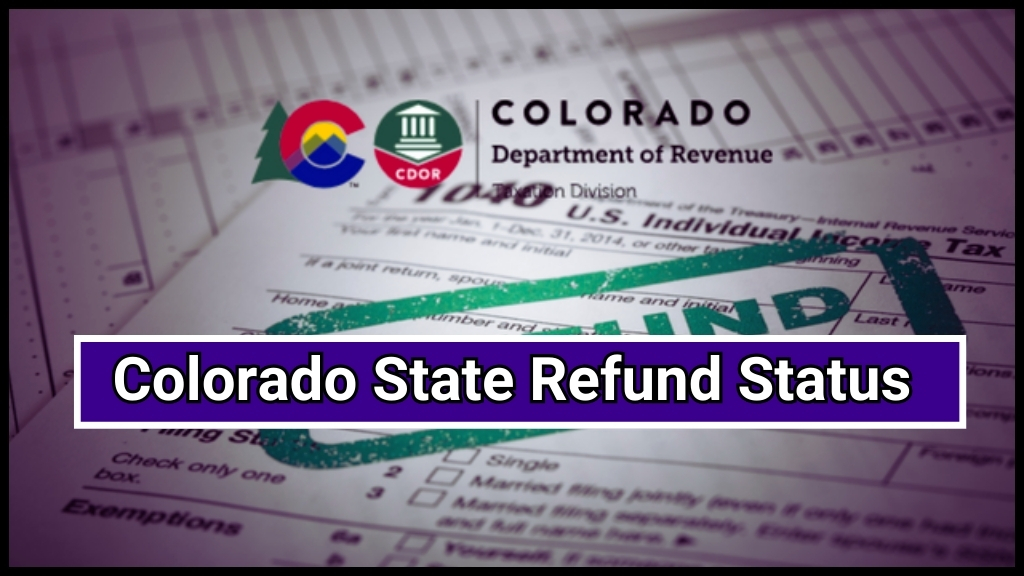Colorado State Refund Status : Colorado residents’ earnings are reflected in the Colorado Tax. Personal income is taxed at a rate of 4.4%, with other taxes levied at lower rates. Detailed information on Colorado State Refund Status tax can be easily accessed.
Colorado State Refund Status
When a business in Colorado receives money back from the state, it’s called a business state tax refund. Businesses pay state taxes on their income and can get a refund if they overpay or make errors. They simply file a tax return to claim this refund.
For a Colorado company to qualify for a state tax refund, they need to follow state tax rules and meet specific criteria. The Colorado tax reflects the income of all Colorado residents, with a personal income tax rate of approximately 4.4% and lower rates for other taxes.
Type of Colorado Tax
Colorado is a state in the US with lower tax rates than many others. Some taxes with greater benefits have varying rates. A 4.4% tax rate is applied to personal income, while certain localities impose a cyclical payroll tax with social security benefits for those over 65.
- Sales Tax: Sales tax in Colorado is 2.90%. Food and prescription medications are tax-free, while apparel and cars are taxed at 2.90%.
- Property Tax: Residential households face a property tax of around 6.95%, while multi-family domestic properties are taxed at 6.80%.
- Gas Tax: Gasoline is taxed at 22 cents per gallon, while diesel incurs a tax of 20.5% per gallon.
- Alcohol and Tobacco Tax: Currently, the tax on cigarettes is $1.94 per pack, set to increase to $2.24 in 2024. Alcohol taxes will be $2.28 per gallon for spirits, $0.8 for beer, and $0.28 for wine.
For full benefits, all citizens need to file their taxes accurately and on time.

Colorado residents can benefit from tax credits, like the refundable Colorado Child Tax Credit (CTC), which offers credit for qualifying children based on adjusted gross income. To claim this credit, individuals need to file their taxes accurately and on time. The Colorado CTC is available for children under six years old at the end of the taxable year, and it can be claimed even if a child does not have a valid social security number. Residents can file electronically or by paper using specific forms to claim this credit.
How To Pay Colorado Tax?
Colorado taxes can be paid conveniently through various methods. You can pay using cash, credit/debit card, check or money order, and Electronic Fund Transfer (EFT). To pay your Colorado taxes, simply follow these steps:
- Log in to the website using your web browser.
- Select the preferred payment method for your business.
- Click on “Make Payment.”
- Fill in the taxpayer information and enter the payment amount in the pop-up window.
- Provide your ID number, account type, ID type (CAN, SSN, or ITIN), filing period, and payment method before entering the amount.
- Click on “Add” and confirm the details.
- Choose “Pay Online” to proceed with the online payment process.
- Enter the necessary information for your electronic check or debit/credit card.
Where’s My Refund, Colorado?
Answer
- Visit https://tax.colorado.gov/refund.
- Select “Check the Status of Your Refund” from the “Welcome to Revenue Online” menu.
- Verify if you used the correct mailing address when filing your return.
- If you are eligible for the Colorado Cash Back refund, expect a tax rebate of $750 for individual filers and $1,500 for joint filers.
- For any changes to your refund address, contact the Tax Information Call Center at 303-238-7378.
- In case of a lost, missing, or destroyed refund check, request a new refund through the reissue process.
- Be aware that additional verification measures may be required by the Department to ensure accurate refunds, potentially delaying refunds by up to 60 days.
- For further assistance or information, contact the call center at 303-951-4996 or visit Colorado Cash Back
Why is The Colorado Tax Refund Delayed?
- Incorrect Information: Errors in tax returns, whether numerical or other mistakes, can slow down the refund process. When errors are detected, the return undergoes human review, leading to delays in processing.
- Incomplete Tax Return: If your tax return lacks essential information, the IRS will not accept it, causing delays. Seeking advice from an accountant can help ensure all necessary details are included.
- Using Multiple Forms: Completing your return with multiple forms can complicate the process and potentially delay your refund.
- Submitting Incomplete Data: Sending a return with missing or incomplete information can lead to processing delays.
- Delivery to the Wrong Bank: If a tax return is mistakenly sent to a different bank, Colorado’s fraud protection measures may delay individual income tax refunds for up to 60 days.